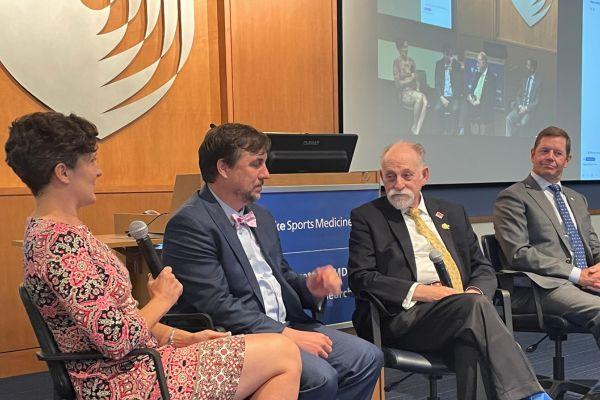Garrett Research Day: Panel Tackles Tough Questions Around Scholarly Publishing

When publishing scholarly work, what’s the best way to list the authors? If you get a scathing letter about your work, do you have to respond? Is it okay to use Chat GPT to help draft your article?
These were among the questions fielded by participants on the panel, “Publication, Ethics and Professionalism,” at Duke Sports Medicine’s 4th Annual William E. Garrett Jr. MD, PhD Research Day on June 28, 2023.
Dr. William E. Garrett, Jr. Visiting Professor Bruce Reider, MD, serves as editor and chief of the American Journal of Sports Medicine and executive editor of medical publishing for the AASOM. He was joined by panelists Lou DeFrate, ScD, Dean Taylor, MD, and Jocelyn Wittstein, MD. Ned Amendola, MD, moderated the segment.
Dr. Reider said there is no universal agreement on guidelines for authorship and how those who contributed to the study and article should be listed as authors of the publication. Institutions often differ on how authors are listed, and many may follow different traditions.
“We get letters to the editor, and we communicate them to the authors. Once in a while, we get authors who are reluctant to respond,” he said. “I always write to them very poignantly and say that responding to post-publication critique is an important part of being an author of the paper and we expect you to respond.”
Dr. Reider advised scholars to think about the best “home” for their publication and to do the legwork by reading past issues of their target journal to ensure the material and format are a fit.
“Ask yourself ‘what kind of audience do I want to reach? Do I want to reach a general medical audience?' Decide who you really want to be your core readers,” advised Dr. Reider.
When asked about whether an author must respond to criticism when it is not presented in a professional manner, Dr. Wittstein suggested taking the high road.
“Explain the fallacies of their comments and in some ways let their behavior perhaps speak for itself. I think if you can respond and answer their complaints with logical answers, that is the best path,” she said.
Several attendees asked about emerging artificial intelligence tools, like Chat GPT, and whether they should be used to write or review scholarly submissions.
Dr. Reider said he and colleagues have been talking about adding questions for authors to include in their ethical declarations to disclose whether they used artificial intelligence to write their submissions.
“Fraud is fraud and people were committing fraud before there was Chat GPT and if you fabricate your data, it is fraud,” he said. “On the other hand, if you use artificial intelligence to help you display it better or report it better, personally, I don’t see that as very different than asking a professional writer to clean up your paper and make it better.”
The annual event is named for William E. Garrett, Jr., MD, Phd (1949-2019) who served Duke University Medical Center for more than 40 years. He was a consummate physician, clinician-scientist, and teacher. As a specialist in sports medicine for 30 years, he served as the medical director of the U.S. Soccer Federation and team physician for the U.S. Men and Women's National Soccer teams, as well as many Duke teams.